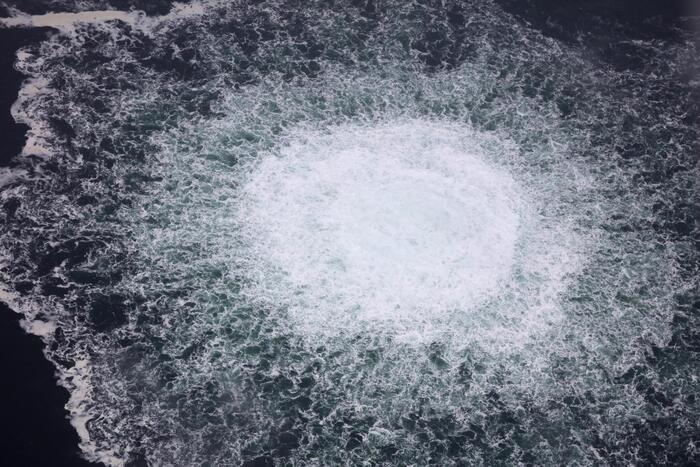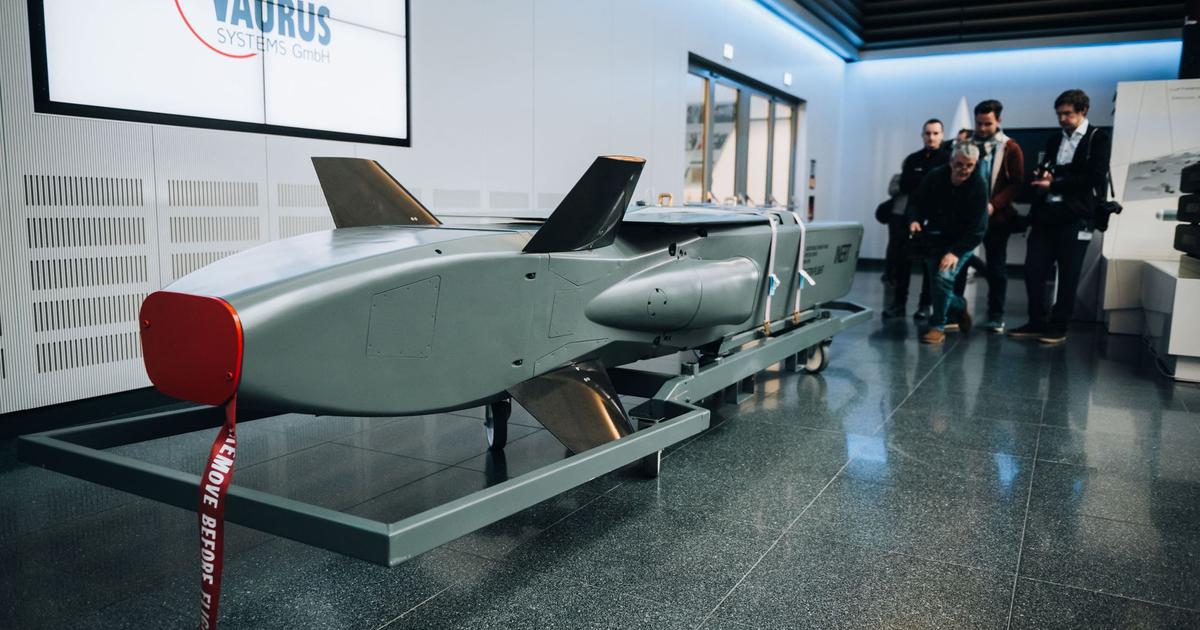Enlarge image
Landing station of the Nord Stream pipeline in Lubmin (Mecklenburg-Western Pomerania): Maintenance work will start on Monday
Photo: Hannibal Hanschke / REUTERS
It's a metallic hiss, a whistle, and a buzz.
In the middle of nowhere, on a peninsula not far from the village of Lubmin on the Greifswalder Bodden, the noise of the gas pipes breaks through the silence day and night.
It's a menacing sound that hurts your ears after a while.
The noise from the Nord Stream 1 landing station underscores the seriousness of the situation these days.
In Lubmin, a fateful place for German energy policy, but also elsewhere. Gas arrives in Lubmin.
Russian gas, through the Nord Stream 1 pipeline. Right behind the also fenced-off facility of Nord Stream 2, another concrete symbol of Germany's naivety towards Putin's regime.
Despite all the demands from the left and the AfD, it will probably never go into operation and end up as a technological ruin.
Just like the Bruno Leuschner nuclear power plant, once the pride of the GDR, whose remains frame the backdrop in Lubmin.
Next week it will be quiet in Lubmin.
The annual maintenance work on the Nord Stream 1 pipeline will begin on Monday. The operator of the tube, Nord Stream AG, based in Zug in Switzerland, will "temporarily shut down both lines of its gas pipeline for routine maintenance work," as the company announced.
The work is expected to last until July 21st.
The fear of the gas supply stop
The fear of politics and business in the coming weeks is great.
What if the maintenance work takes longer and becomes "political maintenance", as Klaus Müller, head of the Federal Network Agency, fears?
What if Putin's regime shuts off the gas supply to Germany completely?
Apart from the fact that stopping gas supplies would also pose a serious problem for Russia – the gas from the Siberian fields cannot simply be “turned off” – concerns about the far-reaching consequences for the economy and consumers are increasing these summer days.
The worries are not new.
As early as April, Martina Merz, the CEO of Thyssenkrupp, warned in an interview with SPIEGEL that entire branches of industry could go without Russian gas.
A "shutdown and decommissioning" would then be inevitable.
And the past few weeks have made many people aware of Germany's great dependence on Russian gas.
For example, when Nord Stream AG, which is 51 percent owned by the Russian state-owned company Gazprom, cut back its deliveries to Germany at the end of June.
At the same time as the Federal Chancellor's visit to Kyiv, Nord Stream AG reduced the amount of gas through the tube in Lubmin to 40 percent of its capacity.
This led to the activation of the second of a total of three warning levels in the federal government's "Gas Emergency Plan".
Russia justified the throttling with the lack of a turbine that is being serviced in Canada.
Federal Minister of Economics Robert Habeck (Greens) considers this justification to be an "advanced reason", Chancellor Scholz (SPD) said "no one in the EU believes that Russia will reduce its gas supplies for technical reasons".
Gas as a weapon, once more.
Enlarge image
Economics Minister Robert Habeck: “Political Nightmare Scenario”
Photo: Florian Gaertner / photothek / IMAGO
In the meantime, the Canadian government has approved the turbines that were serviced at Siemens in Montreal "for technical reasons".
"We welcome the decision of our Canadian friends and allies," said the Chancellor.
For the Canadians, the release of the turbine is a delicate step because they would have violated sanctions regulations by delivering the turbine to the Russian state-owned company Gazprom.
Now, however, the turbine will be delivered to Germany with a time-limited and revocable permit for Siemens Canada, according to the Canadian government.
State aid for ailing gas importer?
The sigh of relief in Germany is likely to be short-lived.
Germany could face difficult months, even an economic crisis.
Federal Minister of Economics Robert Habeck chose drastic words in an interview with Deutschlandfunk: “It may be that nothing comes at all.
And to be honest, we always have to prepare for the worst and work a little for the best,” says Habeck.
But is the country prepared for what could come?
The worries of the economics minister apply above all to the gas storage facilities.
If they are not filled, it could get even tighter in winter.
The gas storage tanks are currently 62 percent full.
Habeck criticized the fact that some gas suppliers have switched to releasing gas from the storage facilities because of high prices – as well as the European regulations, which stipulate that in the event of a gas shortage, savings should first be made by companies and lastly by consumers.
“I find that unsatisfactory.
But it's the European legal norm and it hasn't been changed yet,' he said.
Like Olaf Scholz, Habeck welcomed state aid for the ailing gas importer Uniper in Düsseldorf, a subsidiary of the Finnish state energy company Fortum.
"I have a responsibility for energy security in Germany, and you have to face it," said Habeck.
The tenor was that people in Germany should also face up to this responsibility.
The country should save energy, even in summer.
A few degrees less when showering, a little shorter.
But while the men in the coalition have begun a public shower competition of Loriotian proportions (Habeck: "I've never showered for five minutes in my life." - Kubicki: "I mostly take cold showers.") the low-income earners in the country will be even more difficult.
Consumer Protection Minister Steffi Lemke (Greens) warned in the "Bild am Sonntag" of "difficult times" in winter and demanded: "We then need a moratorium on electricity and gas cuts for consumers".
The background to the demand is the danger that the Federal Network Agency could, in an extreme situation, allow energy suppliers to pass on sharply increased prices to consumers in current contracts.
That would lead to high additional payments – for everyone.
The consequences could be severe, possibly too severe, so the tenor, even for the opposition.
CDU social politician Kai Whittaker, for example, called for gas money of 2,000 euros for the lower income bracket, combined with a suspension of VAT on gas, "so that people can pay their additional payments that will come in February," said Whittaker broadcaster ntv.
FDP demands examination of gas production in the North Sea
There are also tensions in the coalition over the question of how the coming winter is to be dealt with.
The FDP does not agree with the course of the environment and economics ministries (both green).
It's about old questions, old certainties.
"A possible continued operation of our nuclear power plants that are still on the grid must therefore now be reassessed and certainly differently than we were able to do in the spring," says Carina Konrad, deputy parliamentary group leader, to SPIEGEL.
The Ministry of the Environment, headed by Lemke, had refused continued operation with reference to an "intensive review" and talks with the operators.
Her ministry is also coming under increasing pressure for this attitude.
The FDP also demands that the scarce gas "must be made available primarily for housing and industry and not be converted into electricity".
»In the long term, this means that we also consider German gas production in the North Sea and on land in order to free ourselves from the fatal dependency on Russia.«
This question is likely to cause great astonishment for the Green coalition partner.
Much more serious is the question of what will happen if the gas shortage actually occurs.
When not only the second, but also the third stage in the emergency plan has to be activated.
Who will be the first to turn off the gas?
Habeck spoke of a “political nightmare scenario”.
But what was the result?
What is the consequence of the polyphonic warnings?
The government is remarkably silent on this issue.
Just like those who called for a complete gas embargo at the beginning of the war.
And like the Nord Stream 1 plants in Lubmin.
Starting tomorrow when the gas stops flowing.





